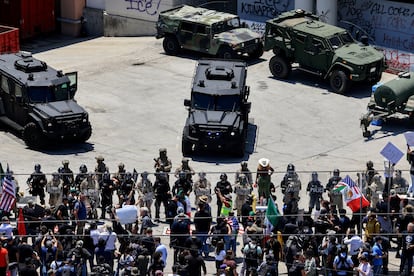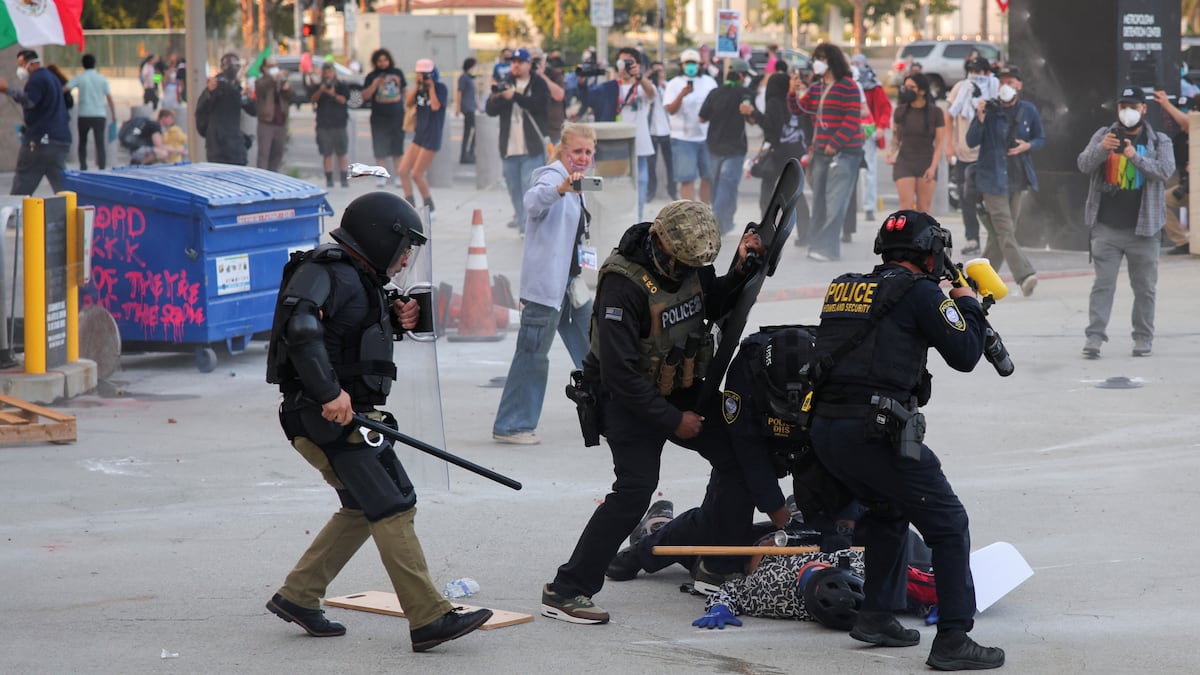Federal prosecutor Bill Essayli’s attempts to prosecute dozens of demonstrators in Los Angeles for alleged attacks on federal agents during early June protests against immigration raids in the city have ended in setbacks, administrative errors, and questionable charges. According to reports and court records, in several cases, the prosecutor has been unable to obtain indictments from a grand jury, despite only needing evidence of crimes; and in others, charges have been dismissed after it emerged that the initial charges were based on inaccurate or, in some cases, outright false testimony.
When Essayli was appointed by Pam Bondi as the federal prosecutor for Los Angeles and surrounding areas in early April, the message was sold that unmasked Trumpism had reached the California justice system. “I will work diligently and tirelessly with our federal and local law enforcement partners to implement the priorities of the President and the Attorney General,” Essayli said at the time. A few months later, in the days following the protests against immigration raids in Los Angeles, the 38 indictments against people involved in the demonstrations that culminated in the federal government deploying 4,000 National Guard troops and 700 Marines to the city confirmed Essayli’s words.
Yet, some six weeks later, he has only secured seven grand jury indictments in proceedings stemming from the protests, an unusually low number given the minimal evidentiary requirements of these preliminary proceedings. Of the remaining cases, five have been dismissed without prejudice, allowing them to be reopened later if new evidence emerges; nine have been downgraded to lesser charges after the evidence was evaluated; and three have been resolved through plea agreements. All this despite direct pressure from Essayli and Attorney General Bondi, who has publicly urged a hard line against the protesters.
 Police and National Guard during protests against immigration raids in downtown Los Angeles, June 10, 2025.David Swanson (REUTERS)
Police and National Guard during protests against immigration raids in downtown Los Angeles, June 10, 2025.David Swanson (REUTERS)
According to a report from the Los Angeles Times, these results have frustrated Essayli. According to the newspaper, he was heard shouting at a subordinate at the federal courthouse, demanding that the protocol that instructs prosecutors to only present cases that have a real chance of success at trial be ignored.
But to do so, cases must be supported by clear evidence, and many of the charges have been dropped because the prosecution’s versions of events were contradicted by videos, internal Department of Homeland Security (DHS) documents, or the prosecutors themselves. According to an investigation by The Guardian, in at least five cases, immigration agents provided statements that turned out to be false or misleading.
One of the most serious cases was that of Christian Cerna-Camacho. Arrested days after a protest, his indictment incorrectly named another protester, an error that calls into question the reliability of all prosecution documentation. Another emblematic case is that of Bryan Ramos-Brito, who was accused of assaulting officers, although a video shows that it was an officer who pushed Ramos-Brito first, not the other way around. The inconsistencies revealed led the DHS to rewrite its own version of events days later, acknowledging errors in the chronology.
The downgraded or dismissed cases reveal a pattern of intimidation, experts say. Filing serious charges and then later downgrading them can instill fear and discourage peaceful protest, as all the protesters whose charges were dismissed had already spent several days in detention. Furthermore, even if the charges are dropped, the arrests leave a mark on their records, generate legal costs, and cause reputational damage.
Andrea Vélez’s case is illustrative. According to her lawyer, she was violently arrested by masked men as she tried to get to work. She was accused of hitting an officer, but the video and subsequent testimony indicated that she only lifted her bag in self-defense. The charges were dropped without explanation, but Vélez suffered and will be scarred for the rest of her life.
This judicial offensive by Essayli has also caused tensions within the prosecutor’s office itself. Some federal prosecutors have refused to sign indictments considered “weak,” and others have already resigned following disagreements with Essayli. In the most serious cases, such as those involving alleged Molotov cocktail attacks, the indictments have been handled solely by Essayli and his deputy, without the support of his usual team.
The political pressure on Essayli is difficult to ignore. He was appointed interim in April and needs Senate approval before September to remain in office. If he fails to do so, a judicial panel could replace him. This context has led commentators to interpret his actions as an attempt to consolidate his position with the Trumpist base. The strategy, however, could backfire. California’s Democratic senators, Adam Schiff and Alex Padilla, have expressed doubts about his leadership and could openly campaign against him, which in a divided Senate has the potential to be decisive.
What began as a judicial operation against alleged riots has quickly become a reflection of the internal fractures to which the Trump administration is subjecting the U.S. justice system, the excesses of the immigration system, and the instrumentalization of the law for political purposes.
Sign up for our weekly newsletter to get more English-language news coverage from EL PAÍS USA Edition
